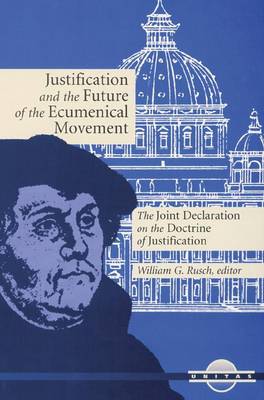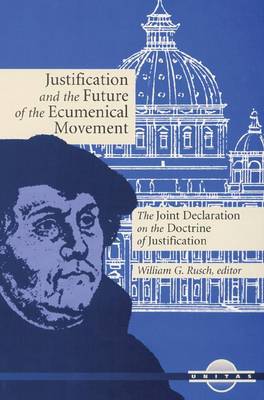
- Afhalen na 1 uur in een winkel met voorraad
- Gratis thuislevering in België vanaf € 30
- Ruim aanbod met 7 miljoen producten
- Afhalen na 1 uur in een winkel met voorraad
- Gratis thuislevering in België vanaf € 30
- Ruim aanbod met 7 miljoen producten
Justification and the Future of the Ecumenical Movement
The Joint Declaration on the Doctrine of Justification
George LindbeckOmschrijving
On October 31, 1999, in Augsburg, Germany, officials of the Lutheran World Federation and the Roman Catholic Church signed two documents, an Official Common Statement with its Annex and the Joint Declaration on the Doctrine of Justification. The Lutheran Churches belonging to the Lutheran World Federation and the Roman Catholic Church were declaring publicly and in a binding manner that a consensus in basic truths of the doctrine of justification exists between Lutherans and Catholics.
Within four months of the Augsburg signing, the Yale University Divinity School and the Berkeley Divinity School at Yale sponsored a theological conference Justification and the Future of the Ecumenical Movement." The goal of the conference was to begin testing the wider import of theJoint Declaration.
The essays in Justification and the Future of the Ecumenical Movement explore the larger implications of the Joint Declaration. The majority of the chapters are the presentations made at Yale in 2000. Three of the chapters were written later than the Yale conference and are included in this collection to expand the range of the discussion and to add new insights.
Justification and the Future of the Ecumenical Movement includes: Introduction by William G. Rusch; *The University and Ecumenism, - by George Lindbeck; *The Joint Declaration on the Doctrine of Justification: A Roman Catholic Perspective, - by Walter Cardinal Kasper; *An Anglican Reaction: Across the Reformation Divide, - by Henry Chadwick; *A Model for a New Joint Declaration: An Episcopal Reaction to the Joint Declaration on Justification, - by R. William Franklin; *The Implications of the Joint Declaration on Justification and Its Wider Impact for Lutheran Participation in the Ecumenical Movement, - by Michal Root; *The Joint Declaration and the Reformed Tradition, - by Gabriel Fackre; *The Joint Declaration on Justification: A Significant Ecumenical Achievement, - by Edward Idris Cardinal Cassidy; *Beyond Justification: An Orthodox Perspective, - by Valerie A. Karras; and *Justification and the Spirit of Life: A Pentecostal Response to the Joint Declaration, - by Frank D. Macchia.
William G. Rusch, D.Phil., executive director of the Foundation for a Conference on Faith and Order in North America, is active in national and global ecumenical affairs.
From 1990 until 2001 Edward Idris Cardinal Cassidy served as the president of the Pontifical Council for Promoting Christian Unity of the Roman Catholic Church at the Vatican.
Professor Henry Chadwick has held the Regius chairs of Divinity both at the University of Cambridge and the University of Oxford. He has been a member of the Anglican Roman Catholic International Commission and the author of numerous books and articles on patristic and ecumenical themes.
Professor Gabriel Fackre is an emeritus faculty member of Andover Newton Theological School. He was a member of the Lutheran-Reformed dialogue in the United States. He has written extensively in the areas of systematic and ecumenical theology.
Professor R. William Franklin is dean emeritus of Berkeley Divinity School, Yale University. He is currently the Bishop's Scholar-in-Residence for the Episcopal Diocese of New York.
Professor Valerie A. Karras is a member of the faculty of St. Louis University. She is a patristics scholar and a member of the Greek Archdiocese of America. Her writings include both patristic topics and ecumenical themes.
Since 2001 Walter Cardinal Kasper has served as president of the Pontifical Council for Promoting Christian Unity at the Vatican. Formerly a professor of theology and diocesan bishop in Germany, he has written in the fields of systematic and ecumenical theology. Cardinal Kasper is a former member of the Commission on Faith and Order of the World Council of Churches.
Professor George Lindbeck is an emeritus member of the faculty of the Divinity School of Yale University. A lutheran layman, he was an observer at the Second Vatican Council, and a member of the American and International Lutheran-Roman dialogues. He is an author of works dealing with systematic theology and Lutheran-Roman Catholic relations.
Professor Frank D. Macchia is a member of the faculty of Vanguard University. An ordained minister in the Assemblies of God, he is a past president of the Society for Pentecostal Studies. He has published in the areas of spirituality and pneumatology, especially in the context of Pietism and Pentecostalism.
Professor Michal Root is a member of the faculty of Trinity Lutheran Seminary. A lutheran layman, he has served as research professor and director of the Institute of Ecumenical Research in Strasbourg, France. He is a member of the Lutheran/Roman Catholic Dialogue in the United States and has written or translated several works dealing with ecumenical theology.
"Specificaties
Betrokkenen
- Auteur(s):
- Uitgeverij:
Inhoud
- Aantal bladzijden:
- 149
- Taal:
- Engels
- Reeks:
Eigenschappen
- Productcode (EAN):
- 9780814627334
- Verschijningsdatum:
- 1/10/2003
- Uitvoering:
- Paperback
- Formaat:
- Trade paperback (VS)
- Afmetingen:
- 150 mm x 235 mm
- Gewicht:
- 276 g

Alleen bij Standaard Boekhandel
Beoordelingen
We publiceren alleen reviews die voldoen aan de voorwaarden voor reviews. Bekijk onze voorwaarden voor reviews.











